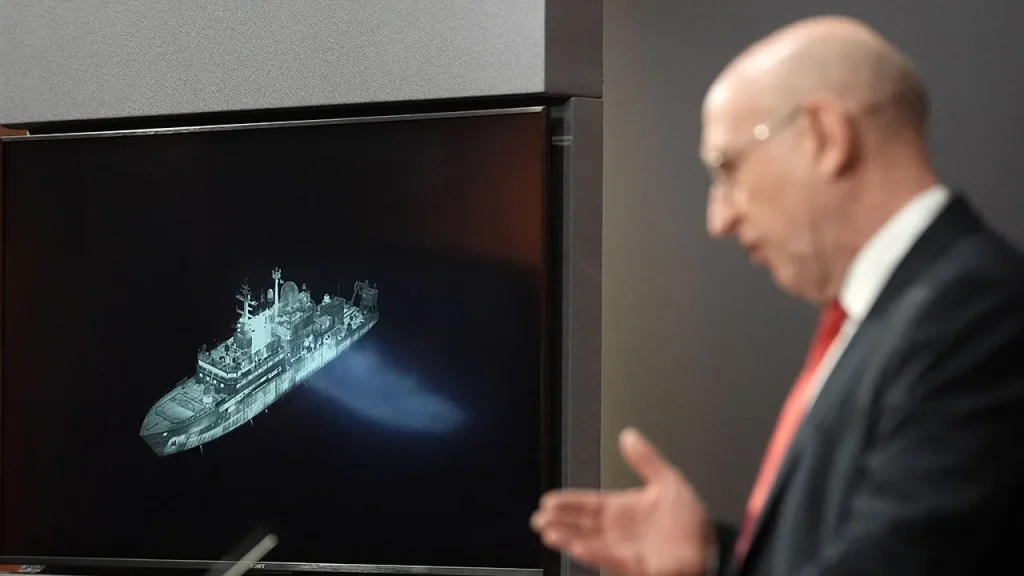British Defense on Alert as Russian Spy Ship Approaches UK Waters
In a significant development that highlights ongoing tensions between Russia and NATO allies, British defense officials have announced that a Russian spy ship, the Yantar, has been detected on the edge of United Kingdom waters. This marks the second time this particular vessel has approached UK territory, according to Defense Secretary John Healey, who addressed the situation during a recent press conference. The Yantar is specifically designed for intelligence gathering operations and mapping undersea cables—critical infrastructure that facilitates global communications and data transfer. The UK’s response was swift and decisive, deploying both a Royal Navy frigate and Royal Air Force planes to track the vessel’s movements. During this surveillance operation, defense officials reported a concerning escalation: the Yantar allegedly directed lasers at British pilots, an action that could potentially interfere with aircraft operations and pose safety risks to personnel.
The situation represents more than just a routine maritime encounter—it symbolizes the increasingly assertive intelligence activities conducted by Russia in the waters surrounding NATO countries. In his statement, Healey delivered a pointed message directly to Russian President Vladimir Putin: “We see you, we know what you’re doing and if the Yantar travels south this week, we are ready.” This unusually direct communication from a senior defense official underscores the seriousness with which the UK views these incursions. The Yantar’s presence comes at a time of heightened awareness regarding vulnerabilities in national defense infrastructure, particularly following a recent Commons Defence Committee report which criticized the UK for lacking “a plan for defending the homeland and overseas territories” and called for better public communication about potential threats.
What makes the Yantar particularly concerning to Western defense analysts is its operational affiliation. Rather than functioning as part of standard Russian naval operations, the vessel belongs to Moscow’s Main Directorate of Deep-Sea Research (GUGI), a specialized unit primarily focused on surveillance during peacetime and potential sabotage operations during conflicts. This specialized capability has raised alarms about the vulnerability of undersea infrastructure, including the vast network of fiber optic cables that carry the majority of the world’s internet traffic. These cables represent a critical but physically vulnerable component of global communications systems. The UK’s aggressive tracking of the vessel reflects growing concerns about the potential for interference with or damage to these crucial undersea assets.
The incident occurs against a backdrop of increasing Russian military activity around NATO borders. Similar incidents have been reported near Alaska, where U.S. forces have scrambled fighter jets multiple times in recent weeks to track Russian spy planes approaching American airspace. NATO has also reported intercepting Russian aircraft near Romania’s border with Ukraine, highlighting a pattern of testing Western response capabilities and gathering intelligence on NATO defense systems. These activities collectively point to Russia’s continued strategy of probing Western defenses and maintaining pressure through low-level provocations that remain below the threshold of direct military confrontation. For the UK, this latest maritime incursion reinforces the need for vigilance in protecting territorial waters and critical infrastructure.
In response to these evolving threats, the UK government has announced plans to enhance its defense manufacturing capabilities, including the construction of multiple factories dedicated to producing munitions and military explosives. The first of these facilities is expected to break ground next year, signaling a long-term commitment to strengthening Britain’s defense industrial base and reducing dependence on foreign suppliers for critical military components. This investment comes as many NATO countries are reassessing their defense production capabilities after years of peacetime reductions, with the Russia-Ukraine conflict highlighting potential supply chain vulnerabilities. The Yantar incident provides additional justification for these investments, demonstrating that the threat environment extends beyond conventional military confrontations to include intelligence gathering and potential sabotage operations targeting critical infrastructure.
Healey’s concluding remarks emphasized the UK’s commitment to a coordinated approach with NATO allies in countering Russian intelligence activities: “That is why we’ve been determined. Whenever the Yantar comes into British wider waters, we track it, we deter it, and we say to Putin, ‘We are ready, and we do that alongside allies.'” This statement reflects the broader Western strategy of maintaining unity in the face of Russian provocations while demonstrating robust response capabilities. As tensions between Russia and NATO countries continue, incidents like the Yantar’s approach to UK waters serve as reminders of the ongoing intelligence contest taking place beneath the surface of more visible geopolitical confrontations. The UK’s public acknowledgment of both the threat and its response capabilities sends a clear message that, despite the Commons Defence Committee’s concerns about homeland defense planning, Britain remains vigilant and prepared to protect its territorial integrity and critical national infrastructure against potential threats.


